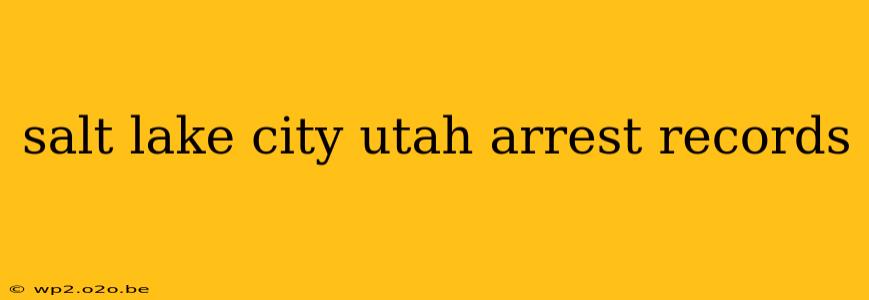Finding arrest records in Salt Lake City, Utah, requires understanding the legal framework and available resources. This guide provides a clear path to accessing this information, emphasizing legal limitations and ethical considerations.
Understanding Utah's Public Records Laws
Utah is a state with relatively open access to public records, including arrest records. However, the specifics of what's available and how to obtain it can be complex. The Utah Government Records Access and Management Act governs the release of public information. This means that while many records are considered public, there are exceptions for protecting individuals' privacy and ongoing investigations.
What Information Might Be Available?
Generally, you might find the following information in a Salt Lake City arrest record:
- Arresting agency: (e.g., Salt Lake City Police Department, Unified Police Department of Greater Salt Lake)
- Booking date and time: The date and time the individual was taken into custody.
- Charges: The specific criminal charges filed against the individual.
- Booking number: A unique identifier for the arrest.
- Disposition: The outcome of the case (e.g., dismissed, convicted, acquitted). This information may not be immediately available, especially for ongoing cases.
- Personal identifying information: This usually includes the arrestee's name, date of birth, and address, but access is sometimes limited to protect privacy.
How to Access Salt Lake City Arrest Records
There are several avenues for accessing arrest information in Salt Lake City:
1. Salt Lake City Police Department (SLCPD):
The SLCPD is the primary source for arrest records within city limits. Their website may offer online access to certain information, though full records may require an in-person visit or a formal records request. Be prepared to provide specific identifying information about the individual you're searching for to aid their search.
2. Unified Police Department of Greater Salt Lake (UPD):
If the arrest occurred outside the city limits but within the jurisdiction of the UPD, contacting them directly is necessary. Their process for accessing records may differ from the SLCPD.
3. Third-Party Websites:
Several commercial websites aggregate public records, including arrest information. While convenient, use caution. Verify the accuracy and legitimacy of the information obtained from these sites, as the information may be incomplete or outdated. Furthermore, be wary of services charging exorbitant fees for information readily available through official channels.
4. Utah Courts:
For information on the legal disposition of a case following an arrest (e.g., court dates, convictions), you'll need to consult the Utah court system's online resources or visit the relevant courthouse.
Important Considerations
- Fees: Expect to pay a fee for obtaining arrest records, varying depending on the agency and the amount of information requested.
- Timeframe: Processing times for requests can vary. Be patient and allow sufficient time for your request to be fulfilled.
- Privacy Concerns: Remember that accessing and sharing arrest records carries ethical and legal implications. Ensure your request is for legitimate purposes and comply with all applicable privacy laws. Misuse of this information can have serious consequences.
Disclaimer
This information is intended for guidance only and does not constitute legal advice. Always consult directly with the appropriate law enforcement agency or legal professional for specific guidance related to accessing Salt Lake City arrest records. The procedures and availability of information may change; therefore, verifying the latest policies with the relevant authorities is crucial.

